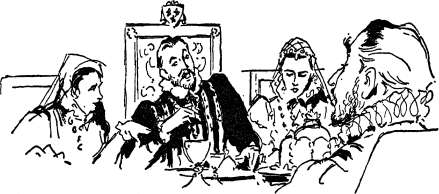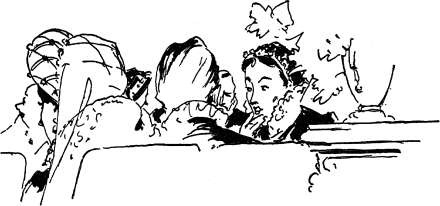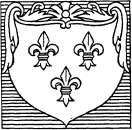Dark Eminence Catherine De Medici And Her Children (15 page)
Read Dark Eminence Catherine De Medici And Her Children Online
Authors: Marguerite Vance

RJieims took place in February, 1575, and two days later he and Louise were married.
The gentle, lovely bride who had spent so much of her girlhood with the Kings sister Claude, Duchess of Lorraine, and had absorbed so much of her quiet dignity, watched her bridegroom's antics at the wedding feast and must have wondered how a newly anointed King of France could make such a spectacle of himself. For as though to compensate himself for a marriage in which he had little heart, he acted the buffoon, trying, it seemed, to escape from reality into a mocking half-world of his imagination. But in the midst of the festivities tragedy struck. A messenger brought word that the Duchess of Lorraine was dying; and now Henry rose to the occasion. He was all grave solicitude, sent his own physician to do what he could, and daily for the next fortnight had Masses said for her recovery.
But Claude, the little crippled sister, died just short of her twenty-seventh birthday, leaving two children, the little Marquis of Pont-a-Mousson and a daughter, Christine, who became Duchess of Florence and Tuscany. Henry shuddered. Only he and Marguerite and Alengon remained— and they both detested him. What was happening to the proud House of Valois? To Catherine, though she did not admit it, it was apparent that the timbers of the House were rotting, that the decay of degeneracy was eating at its heart.
• Two years, three, passed and though both Louise and Henry made repeated pilgrimages to holy shrines and offered continuous petitions, no heir came to bless their
Dark Eminence
marriage. The King, sensitive to another's sorrow, redoubled his efforts to make his wife happy. He took her on long Progresses across the country, built for her a beautiful little castle of her own, showered her with gifts. And Louise, wise, tactful woman that she was, saw through his pitiful repertoire of amends, knew his heart was with the love he had lost and that his kindness to her was perfunctory. She made no complaint and won Catherine s admiration with her dignified acceptance of a situation she was helpless to change.
However, Henry's erratic, unstable personality was again stirring up trouble for him. He was a bachelor by nature, a man who loved to go his own way, choose his friends, stay clear of any hobbling responsibilities. The more unconventional his friends and their habits, the better they pleased him. Now he gathered about him a large group of effeminate-looking young courtiers who were as savagely brave as they were girlish in appearance. They loved shocking the citizens

by wearing their hair in long ringlets, their beribboned clothes impregnated with heavy perfume, and by mincing through the streets, often singing in high falsetto voices. That they should be the Kings closest friends filled the people with loathing; that the French Court was becoming known throughout Europe as the most profligate of all time, this killed the last shred of respect the French felt for the young wastrel who was their King.
Alengon, too, had his young courtiers, many of them with reputations as questionable as those of Henry's loathed mignons, as the people called them. There were ambushes, duels, crimes of every sort, and within three years the mignons had almost entirely disappeared, killed, most of them, by their rivals* This, however, did not change the King, who continued to be the victim of many complexes and the torturing certainty that had he only the will, he could put off the soft, smothering embrace of his own weak nature and become the monarch he otherwise might have been.

f
Chapter 11 THE LAST VALOIS

, the troublesome little brother, tried with the continued help of his sister to run away. Humiliated hy Henry's casual forgiveness for the plot he and Navarre had shared, he found life at Court insupportable. It was almost as though the King had not thought Alengon or his plots important enough to worry about. Then, too, his mother's continuous supervision, her watchful eye on his departures and returns, this was infuriating. Finally, with Marguerite's help, he did manage to escape to the south where he began organizing an army of Huguenots, dissatisfied Catholics, and other malcontents into a band to be known as Protectors of the Liberties of France for the King.
Catherine followed and caught up with him, but for once could not influence him. What the monstrous, strutting little Alengon wanted was his brother Henry's word that he had
a right to be King should lie be victorious in Kis ambitious maneuvers. It was a covetous child's demand for toys he knew he should not have. Henry dared not antagonize him too much, nor dared he let him continue on his rampage, for with his following growing—on the strength of promises impossible to keep—he might easily split the kingdom into many small states with himself ruler of them all!
Then, as though to scotch this fantastic dream of Alen-£on's, Henry of Navarre made his own bid for supremacy. Navarre was well aware of his position as heir presumptive to the throne of France. He was also—at least for the moment—a Protestant. To gather the Huguenot forces to him at this time was all-important; Alengon's forays struck him as childish if infuriating. Like his young brother-in-law, he could be a "liberator' of the kingdom which floundered in a morass of savage waste and depravity.
Desperately the Queen Mother faced the impressive combined forces of her son and her son-in-law and finally in May, 1576, signed a treaty in the name of the King which gave the Huguenots a great victory, Alengon's ego a tremendous lift, and Navarre a gratifying sense of strengthened power.
Poor little Alengon! Though a conquering hero in his own eyes, he still was an irritating nuisance, nothing more, to his brother and his brother's mignons who ridiculed him in public and tormented him at Court. He had come home to the Louvre full of self-confidence and pride, but before he had been there a month he knew he could not stay if he were to keep his sanity. Both his mother and the King were determined to keep him where he could not stir up further
trouble and lie "became a virtual prisoner in the palace. But Marguerite, knowing no tetter way to exasperate her brother Henry, helped Alengon to escape by a rope let down from her own window!
To Flanders, to England where Queen Elizabeth gave him a jewel but continued to withhold her answer to his proposal of marriage, and so at last, his sickly body worn out, his dream of glory and of grandeur indescribable ended, he managed to reach his castle at Chateau-Thierry. There he died in June, 1584, aged thirty years. He wanted so very much to be known by a title which he never achieved, Duke of Brabant. Even in death he was thwarted, for his fervent request to be buried under his sovereign title was ignored, and on his tomb at Saint-Denis the name by which he was known in life is carved for all the world to see: Duke of Alengon.
With the death of Alengon there rose the inevitable question of King Henry s successor, and as Henry of Navarre, his Bourbon cousin, was the next in line, there the answer rested. But not for long. Navarre was a Protestant, a Huguenot, and never in the history of France had a Protestant King sat on the throne. It could not be.
And here, as in the days of Coligny, the name of Guise slid quietly into the picture. Henry, Duke of Guise, was still carrying the family banner in the general direction of the throne. He had been one of the founders of the powerful Catholic League organized to rout out the King's wavering religious leadership. Now he was sweeping Paris with a dramatic personal appeal very like his father's years earlier.
Added to this, Protestant Queen Elizabeth in England had just ordered his cousin Mary Stuart executed and this had stimulated the sympathetic devotion of the French for their idol The fact that Henry, their King, had done his best to stop the execution they chose to ignore. They loved Guise; they wanted Guise, no one else. Away with the decadent Valois! Away with the Bourbon succession!
The King was forced to leave Paris, but he returned and having endured every humiliation at the hands of Guise and his League, he came to one of his sudden, unpredictable decisions: the air of France must be cleared of strife, the strife which unfailingly followed in the train of the Guises. Henry, Duke of Guise, must die.
The Duke arrived to attend an early morning conference with the King at Blois. The conference would end, Guise was sure, with his getting one of his most contentious ultimatums: a joining with Spain in the restoration of the Inquisition. Thus far Henry of Valois had been refusing and only a week ago had said in ringing tones, "I won't have religion become a butchery or the altar of God's sacrifice a shambles/' Well, Guise reflected, chuckling, probably His Majesty had thought better of his high-flown refusal and was ready to capitulate.
Surrounded by retainers, the Duke arrived at the palace and was directed to the King s private audience chamber reached by a long enclosed passage. Scarcely had the door closed behind him when one dagger after another was plunged into his body and he literally fell into the royal presence—dead.
Quickly now, as though the sands of life were running through a tilted glass, Henry, the last of the Valois kings, held a reunion with Henry, King of Navarre, the brother-in-law he never could quite trust, but who was, in the final analysis, of his own blood. For a period Paris seethed with hatred for the King, and then, as though thoroughly sick at last of feuds, the whole country was swept by a miraculous wave of emotion. One issue alone stood out: Henry of Valois was the anointed King; Henry of Navarre his rightful heir; and together they stood for a united France, particularly as Navarre did at last abjure Protestantism and lightly embraced the Catholic faith.
But Henry of Valois was not to enjoy his sudden popularity for long. A mendicant monk assassinated him a few months later in the belief that he was ridding France of a tyrant and its most wicked citizen. Henry of Valois, Henry III of France, died on a September morning in 1589 while receiving the last rites of the Church. So passed the last of the Valois kings, a weakling with a faint strain of Medici strength in his nature which only he and his mother suspected. He survived that doting mother by only a few months.
Of all Catherine s children Marguerite was the most disappointing because the most aloof. Her husband, enraged by her misconducts which had become notorious, sent her from the kingdom of Navarre to her brother s Court. Here her behavior was so shameless that Henry returned her to Navarre and there her marriage finally was annulled. She was the last Valois. She grew old and fat, a little surprised
to find she had teen Queen of France, and died at last in Paris in 1615, the center of a bizarre group of writers, a writer of some talent herself.
For Catherine the years since that long-ago morning when she sat dreaming beside an upper window in Blois had passed in an uninterrupted pageant of dynastic turmoil. Just how much she added to that turmoil by her boundless ambitions is problematic. Certainly she was a product of the times, the blood-stained Renaissance. Coldly calculating she was, but perhaps she learned she had to be to survive.
The children for whom she had such high hopes disappointed her, each one, even beautiful Elizabeth who died without bearing a son. None but Marguerite lived beyond the age of thirty-six and all but Marguerite were sickly. Nevertheless, singly and together, they helped shape the course of the Renaissance in France and through them the ancient House of Valois came to an end to make way for the Bourbons.
